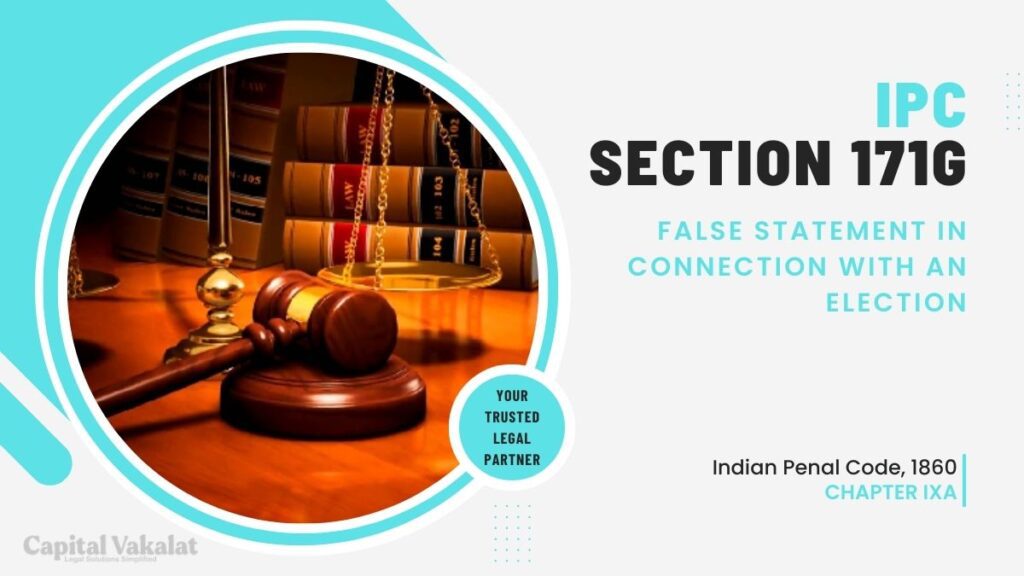In the vibrant tapestry of a democratic society, elections serve as the cornerstone of representation and governance. They empower the citizens to choose their leaders, shaping the future of their nation. However, these elections demand honesty and transparency to maintain their sanctity.

In the Indian context, Section 171G IPC deals with the issue of false statements made in connection with elections. This article delves into the significance of this legal provision and its implications.
Introduction to Section 171G IPC
Section 171G of the Indian Penal Code (IPC) pertains to the making or publishing of false statements, rumors, or reports with the intent to disrupt or mislead the electoral process. It addresses the need to maintain the integrity of elections by preventing the spread of false information.
Understanding False Statements in Elections
False statements can encompass a wide range of actions, from spreading rumors about a candidate to making baseless accusations. Such statements have the potential to influence voters, skewing the electoral process.
Legal Consequences of False Statements
False statements in connection with elections can lead to legal consequences. Violators may face charges under Section 171G IPC, which can result in fines or imprisonment.
The Importance of Truth in Democracy
Democracy thrives on the free and fair expression of ideas and opinions. False statements undermine the trust and credibility of the electoral system, eroding the very foundation of democracy.
Historical Perspective on Electoral Integrity
Throughout history, maintaining the integrity of elections has been paramount. Countries have established laws and regulations to preserve the sanctity of the voting process.
The Role of Media in Election Disinformation
Media plays a crucial role in disseminating information during elections. However, it also has the power to amplify false statements, making it essential for media outlets to exercise responsible reporting.
How Section 171G IPC Addresses False Statements
Section 171G IPC serves as a legal tool to combat the spread of false information during elections. It holds individuals accountable for their actions and ensures that electoral processes remain transparent.
Recent Cases and Controversies
Recent elections have witnessed controversies surrounding false statements. High-profile cases have brought Section 171G IPC into the spotlight, emphasizing the need for its effective implementation.
The Burden of Proof
Proving the veracity of false statements can be challenging, as intent and malice must be established. The burden of proof falls on the prosecution, which must demonstrate the accused’s intent to disrupt the electoral process.
Safeguarding Election Integrity
Safeguarding election integrity is a shared responsibility. Political parties, civil society, and law enforcement agencies must work in harmony to prevent false statements from undermining the democratic process.
Penalties and Punishments
Section 171G IPC stipulates penalties and punishments for those found guilty of making false statements during elections. These may include fines, imprisonment, or both.
The Need for Public Awareness
Public awareness campaigns can play a crucial role in educating citizens about the consequences of false statements in elections. It is essential for people to understand the impact of their choices on the democratic system.
Conclusion
In conclusion, Section 171G IPC serves as a legal safeguard to protect the integrity of elections by deterring the spread of false statements. Upholding the principles of democracy necessitates a commitment to truth and transparency during the electoral process.
To stay informed about legal provisions like Section 171G IPC and their significance in upholding the integrity of elections, access valuable resources through the provided link.
Frequently Asked Questions
Can false statements during elections result in imprisonment?
Yes, false statements during elections can lead to imprisonment under Section 171G IPC, in addition to fines.
How can the burden of proof be established in cases of false statements?
Establishing the burden of proof requires demonstrating the accused’s intent to disrupt the electoral process, which can be a complex legal challenge.
What is the role of the media in preventing the spread of false statements during elections?
Media plays a vital role in preventing the spread of false statements by exercising responsible reporting and fact-checking.
Why is it crucial to maintain election integrity?
Maintaining election integrity is essential to preserve the credibility and trustworthiness of the democratic process.